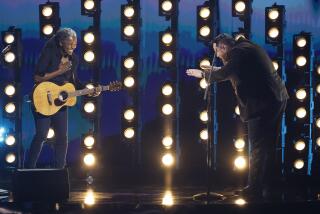Applause, Please, for the Music You Won’t Hear on the Grammys
- Share via
Before the grammy awards are telecast from Staples Center Wednesday, the winner of the only category Bob Banoczi and I care about will already have been announced.
You have to rummage down among “Best Spoken Word Album,” “Best Album Notes” and other categories too unsexy for prime-time TV to find the one that stirs Banoczi’s passions and my nostalgia. That would be “Best Polka Album.”
The 61-year-old Banoczi is known to his devoted listeners as “Polka Bob,” host of “Polka Power,” which airs for six hours every Saturday beginning at noon on KUOR FM-89.1 from the University of Redlands.
Much of his audience is concentrated in Fontana and consists mostly of ethnic Poles, Slovenes, Croats and Italians originally drawn there by the now-defunct Kaiser steelworks. Fontana is an oasis in the polka-impaired desert that is Southern California. Many of the polka Grammy nominees over the years have trekked across the country to play the Sons of Italy and Slovenian Halls in Fontana.
Polka may commonly be thought of as a kitschy backwater on the verge of drying up, but Banoczi takes heart from the ever-evolving nature of the music and the increasing numbers of young people showing up for big dances. “I don’t believe polka will ever, ever die out,” he says. “It will always be there, like the blues, like Cajun.”
It certainly has taken on new resonance for me.
In the bargain section of a record shop one evening in October 1998, I came upon a CD of Frankie Yankovic’s biggest hits. Yankovic’s sweet, decorously paced Slovenian or “Cleveland” style of polka was epitomized by “Just Because,” a crossover hit that sold a million records in 1948 and earned Yankovic the sobriquet “The Polka King.” The song was a staple of every wedding reception I attended during my childhood in our multiethnic eastern Ohio steel town.
So I bought the CD for a sophisticated friend in Los Angeles, by way of giving her fair warning of my origins.
And the very next day the Polka King died. He was 83, and the New York Times ran his obituary above that of Gen. Charles de Gaulle’s chief of staff, which gratified me. Still, I felt almost as though I’d killed him, suddenly rediscovering him like that.
To make it up to Frankie, who won the first polka Grammy in 1986, I want here to give a little interpretive attention and unaccustomed ink to those of his musical heirs nominated for this year’s award. Polka Bob has helped me grasp the nuances in the five nominated CDs.
*
The nominees are:
Jimmy Sturr and his Orchestra for “Polkapalooza.” Sturr’s, the most famous polka ensemble in the land these days, has appeared at the Grand Ole Opry and on “Saturday Night Live” and has recorded with Willie Nelson. Based in upstate New York, it has won 10 of the 15 Grammys ever awarded for polka and is the odds-on favorite again this year. Sturr’s orchestra has a slick, fast-paced, de-ethnicized big-band sound that embraces country, Cajun and other influences. In addition to its vibrant music, recorded on no fewer than 101 albums, the group is thought to benefit from its Nashville connections in Grammy balloting.
Eddie Blazonczyk’s Versatones for “Smokin’ Polkas.” Previous Grammy winner Blazonczyk (he split the award with Sturr in ‘87) helped define the “Chicago style” of polka with its double trumpets and pronounced beat. This album is a blend of old and new; most of the vocals are in Polish, yet the nontraditional use of a fiddle and bellows-shaking concertina gives it at times an almost zydeco-like flavor.
Walter Ostanek for “Yearning for Polkas & Waltzes.” Three-time Grammy winner Ostanek, who’s based in Canada, has a clean, gently jaunty “Slovenian” sound with double accordions and no brass--the kind of sound that probably has Frankie Yankovic smiling somewhere. This album is old-fashionedly charming with its cornball lyrics, occasionally misspelled album notes and credit for “accordion tuning.”
John Gora and Gorale for “Follow Me.” The Poland-born Gora, now a resident of Canada, brings high-energy showmanship to the “Chicago style” with lots of whooping, mostly Polish vocals and saxophone-trumpet harmonizing that, on one track, sounds almost like Dixieland.
Brave Combo for “Polkasonic.” Texas-based Brave Combo is a progressive rock band devoted to adapting polka to younger ears without crossing into parody. “Our ultimate compliment,” says founder Carl Finch, “is hearing some of the Polish bands now recording our versions of songs.” This album mixes traditional instrumentation with everything from tubas to harmonicas to rock guitars and ends with the track “Purple Haze--The Jimi Hendrix Polka.”
All of these CDs brought to my closed eyes an image: My mother and my late father are young again; party-dressed Mom is snapping a half-stick of Doublemint in her mouth and Dad is in a suit instead of steel-mill denims. Their arms are around each other and they are part of a giant circle of laughing couples spinning and quick-stepping to the wedding band in the Greek Orthodox Church basement or the United Steelworkers hall.
My brother and I and other small boys are knee-sliding across the open middle of the floor on soap granules scattered to help the dancers glide. Stains of grape or orange soda have blossomed on our white dress shirts, whose tails long since have liberated themselves from our trousers. The music is guileless, loud and gay and the world is a pretty happy place.
Note to the Grammy bosses: How about we have some polka on the live telecast next year?
(Frankie, can we call it even now?)
*
James Ricci’s e-mail address is james.ricci@latimes.com
More to Read
The biggest entertainment stories
Get our big stories about Hollywood, film, television, music, arts, culture and more right in your inbox as soon as they publish.
You may occasionally receive promotional content from the Los Angeles Times.










